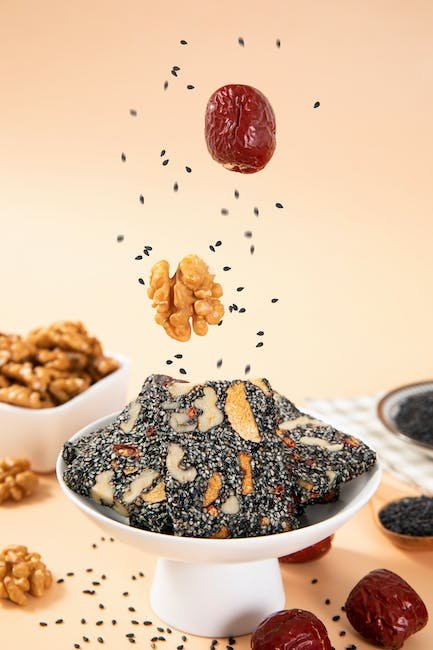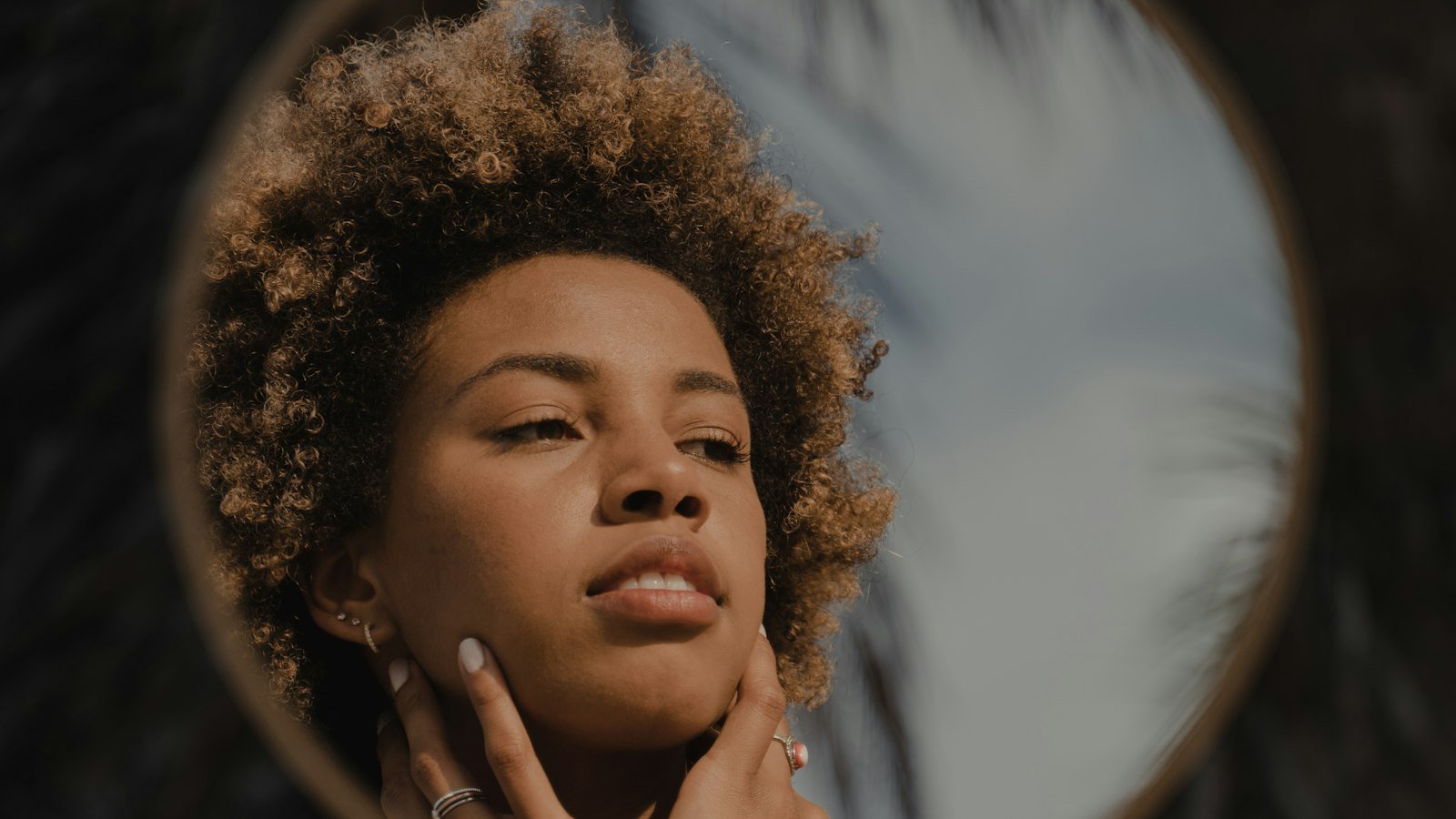After the joyous arrival of a newborn, many new mothers are greeted with an unexpected and disheartening visitor – postpartum hair loss. As if sleepless nights and endless diaper changes weren’t challenging enough, women often find themselves grappling with the shedding of their once-glorious locks. But fear not, dear mothers, for nature has bestowed upon us an arsenal of scrumptious and nutritious foods that can help combat this unwelcome aftermath. So, put aside those hair supplements and embrace the delectable journey we are about to embark upon, as we discover the best foods to nourish our bodies and restore our crowning glories to their former glory.
Table of Contents
- Best Foods for Stronger Hair Post Pregnancy
- Nourishing Nutrients: Key to Preventing Postpartum Hair Loss
- Superfoods for Regaining Hair Strength after Giving Birth
- Powerful Ingredients for Promoting Hair Growth
- Tailoring Your Diet for Fuller, Healthier Hair
- Q&A
- Insights and Conclusions

Best Foods for Stronger Hair Post Pregnancy
After pregnancy, many new mothers experience hair loss or weakened hair due to hormonal changes. However, incorporating certain foods into your post-pregnancy diet can help promote stronger and healthier hair growth. These foods are packed with essential nutrients that nourish the scalp and hair follicles, providing the building blocks for luscious locks.
Fatty Fish: Including fatty fish such as salmon, mackerel, or sardines in your diet can provide a rich source of omega-3 fatty acids. These healthy fats help nourish the scalp and promote hair growth.
Eggs: Eggs are a fantastic source of protein and biotin, which are essential for strong and healthy hair. They also contain other key nutrients such as zinc, selenium, and vitamin D, which contribute to hair strength and growth.
Leafy Greens: Incorporating leafy greens like spinach, kale, or Swiss chard into your meals provides a wide range of vitamins and minerals. These vegetables are particularly rich in iron, which is essential for proper hair growth and preventing hair loss.
Nuts and Seeds: Snacking on nuts and seeds such as almonds, walnuts, and flaxseeds can provide important nutrients like vitamin E, zinc, and selenium. These nutrients help support hair cell repair and promote a healthy scalp.
By including these hair-boosting foods in your post-pregnancy diet, you can nourish your hair from the inside out and enjoy stronger, shinier locks. Remember that consistency is key, so try to incorporate a variety of these foods into your meals to maximize their benefits.

Nourishing Nutrients: Key to Preventing Postpartum Hair Loss
One of the most common concerns that new mothers face is postpartum hair loss. It is a temporary condition that affects many women after giving birth, and it can be quite distressing. However, the good news is that there are ways to prevent or minimize hair loss during this time.
One of the keys to preventing postpartum hair loss is ensuring you are getting all the necessary nourishing nutrients. Here are some essential nutrients that can help maintain healthy hair:
- Protein: Incorporating protein-rich foods such as lean meats, eggs, and legumes into your diet helps provide the building blocks for hair growth.
- Vitamin A: Foods like sweet potatoes, carrots, and spinach are rich in vitamin A, which aids in the production of sebum, a natural conditioner for the scalp.
- Biotin: Often referred to as the “hair growth vitamin,” biotin can be found in foods like eggs, almonds, and salmon. It helps strengthen hair and promotes healthy growth.
- Omega-3 fatty acids: Consuming sources of omega-3 fatty acids, such as fish, flaxseeds, and chia seeds, can help moisturize the scalp and prevent dryness, which may contribute to hair loss.
- Vitamin C: Citrus fruits, strawberries, and bell peppers are packed with vitamin C, which aids in collagen production, an essential component for hair strength and structure.
- Iron: Including iron-rich foods like spinach, lentils, and red meat in your diet can help prevent iron deficiency, which is known to contribute to hair loss.
By incorporating these nourishing nutrients into your daily diet, you can provide your body with the necessary tools to prevent or reduce postpartum hair loss. Remember to consult with a healthcare professional before making any significant changes to your diet, especially if you are breastfeeding or have any specific dietary requirements.

Superfoods for Regaining Hair Strength after Giving Birth
Pregnancy and childbirth can take a toll on a woman’s body, including her hair. Many new mothers experience hair loss or weakened hair after giving birth. However, there are several superfoods that can help in regaining hair strength and restoring its luster. Including these nutrient-packed foods in your diet can provide the essential vitamins and minerals needed for healthy hair growth.
1. Spinach: Packed with iron, beta-carotene, and vitamin C, spinach is an excellent superfood for promoting hair strength. Iron deficiency can lead to hair loss, so incorporating spinach into your meals can help replenish iron levels and stimulate hair growth.
2. Salmon: Rich in omega-3 fatty acids, vitamin D, and protein, salmon is a fantastic choice for restoring hair strength. Omega-3s nourish hair follicles, while vitamin D helps to prevent hair loss. Additionally, the protein content in salmon supports hair growth and gives it a healthy shine.
3. Greek Yogurt: Not only is Greek yogurt a great source of protein that helps in strengthening hair, but it also contains vitamin B5 (pantothenic acid). This vitamin improves blood flow to the scalp, enhancing hair growth and preventing hair thinning. Include a cup of Greek yogurt in your daily diet to reap its hair-nourishing benefits.
4. Chia Seeds: These tiny powerhouses are packed with nutrients, including omega-3 fatty acids, protein, fiber, and antioxidants. The omega-3s in chia seeds promote scalp health, while the protein strengthens hair strands. Furthermore, the antioxidants protect hair cells from damage caused by free radicals, making chia seeds an ideal superfood for regaining hair strength.
5. Sweet Potatoes: Loaded with beta-carotene, sweet potatoes are essential for maintaining scalp health and promoting hair growth. Beta-carotene converts to vitamin A in the body, which helps in producing sebum, an oily substance that nourishes the scalp and keeps hair healthy and shiny.
By incorporating these superfoods into your diet, you can provide your body with the necessary nutrients to regain hair strength after giving birth. Remember, for best results, maintain a balanced and varied diet and consult with a healthcare professional if you have any specific dietary concerns.

Powerful Ingredients for Promoting Hair Growth
When it comes to promoting hair growth, there are several powerful ingredients that can work wonders. These ingredients are packed with essential vitamins, minerals, and nutrients that nourish the hair follicles and promote healthy growth. Whether you’re struggling with thinning hair or just want to give your locks a boost, incorporating these ingredients into your hair care routine can make a noticeable difference.
One of the most effective ingredients for promoting hair growth is biotin. Biotin is a B-vitamin that plays a crucial role in the production of keratin, the protein that makes up our hair. It helps strengthen the hair strands, prevents breakage, and promotes healthy growth. You can find biotin in various foods such as eggs, nuts, and leafy greens, or you can take a biotin supplement for an added boost.
Castor oil is another powerful ingredient known for its hair growth properties. It is rich in omega-6 fatty acids, vitamin E, and proteins that nourish the hair follicles and stimulate growth. Massaging castor oil onto the scalp improves blood circulation and promotes the delivery of essential nutrients to the hair roots. It also forms a protective barrier that helps prevent moisture loss, reducing the risk of breakage and split ends.
Lastly, rosemary oil is an incredible ingredient for boosting hair growth. It increases circulation to the scalp, which stimulates the hair follicles and promotes new hair growth. Rosemary oil is also known for its ability to strengthen the hair shaft, preventing breakage and making your hair appear fuller and thicker. Additionally, it has antimicrobial properties that help keep the scalp healthy and free from bacteria or fungi, which can hinder hair growth.
By incorporating these powerful ingredients into your hair care routine, you can nourish your hair and promote healthy growth. Whether you choose to incorporate them into your diet or use them as topical treatments, the benefits of these ingredients are sure to leave you with luscious locks.
Tailoring Your Diet for Fuller, Healthier Hair
When it comes to achieving fuller and healthier hair, one of the key factors to consider is your diet. What you eat can directly impact the strength, growth, and overall condition of your locks. By tailoring your diet to nourish your hair from within, you can support its natural beauty and promote optimal hair health. Here are some tips to help you get started:
- Increase your protein intake: Hair is made up of a protein called keratin, so it’s crucial to ensure you’re getting enough protein in your diet. Include lean meats, fish, eggs, dairy products, legumes, and nuts to provide your hair with the necessary building blocks for growth and strength.
- Embrace healthy fats: Omega-3 fatty acids found in foods like salmon, avocados, and walnuts can help nourish your hair follicles and promote a healthy scalp. These essential fats also contribute to shiny, lustrous hair.
- Nourish with vitamins and minerals: Certain vitamins and minerals are essential for healthy hair growth. Incorporate foods rich in vitamins A, C, and E, as well as iron, zinc, and biotin. Carrots, citrus fruits, leafy greens, whole grains, and eggs are great options to include in your diet.
Remember, maintaining a well-balanced and nutrient-rich diet is not only beneficial for your hair but also your overall well-being. So, why not start today and create a menu that will give you the beautiful, full hair you’ve always dreamed of?
Q&A
Why does postpartum hair loss occur?
During pregnancy, hormones promote hair growth, resulting in thicker, fuller hair. After giving birth, these hormones drop significantly, causing hair to shed more rapidly than usual.
Which nutrients help combat postpartum hair loss?
Nutrients such as biotin, vitamin E, iron, zinc, and omega-3 fatty acids are essential for promoting hair health and preventing excessive shedding after childbirth.
What are some foods rich in biotin?
Foods like eggs, nuts (especially almonds and peanuts), sweet potatoes, whole grains, and spinach are excellent sources of biotin and can help strengthen hair strands.
Which foods contain vitamin E?
Almonds, sunflower seeds, spinach, avocados, and broccoli are just a few examples of foods that are packed with vitamin E, promoting hair growth and reducing hair loss.
Which iron-rich foods should be included in the diet?
To boost iron levels and combat postpartum hair loss, incorporate foods like lean meats, beans, lentils, dark leafy greens, and fortified cereals into your meals.
What are some good sources of zinc?
Foods like oysters, beef, pumpkin seeds, chickpeas, and yogurt provide ample amounts of zinc, which aids in hair growth and reduces hair shedding.
How can I include omega-3 fatty acids in my diet?
Add foods such as fatty fish (salmon, mackerel, and sardines), chia seeds, flaxseeds, walnuts, and soy products to your meals to benefit from the omega-3 fatty acids that support healthier hair.
Are there any specific meal ideas that incorporate these hair-boosting nutrients?
A breakfast bowl with Greek yogurt, topped with sliced almonds and fresh berries, or a lunch salad containing spinach, grilled chicken, avocado, and pumpkin seeds are nutrient-rich meal options to support postpartum hair health.
Can supplements be taken to combat postpartum hair loss?
Consult your healthcare provider before taking any supplements, as they will be able to assess your individual needs and recommend appropriate options to address postpartum hair loss.
Insights and Conclusions
As we bid farewell to this journey through the best foods for combating postpartum hair loss, let us part ways armed with a plethora of nutritional knowledge. Remember, dear readers, that the battle against the shedding strands that often accompany motherhood can be fought and won with the right arsenal. Embrace a rainbow of colors on your plate, from vibrant leafy greens to luscious berries, and let the power of vitamins and minerals fortify your strands from within.
Perhaps the most profound takeaway from this exploration is the understanding that, just like your little one, your own body requires tender love and care. Nourish yourself, new mothers, both physically and emotionally. Relinquishing the stresses that come with postpartum hair loss doesn’t solely rely on culinary conquests but also on maintaining a balanced lifestyle. Remember to indulge in moments of self-care, seeking solace in activities that bring you joy and tranquility.
So, as you venture forth into the realm of silken locks post-childbirth, armed with this invaluable knowledge, remember that Rome wasn’t built in a day, and neither will your crown of glory be restored overnight. Patience, persistence, and an unwavering resolve to empower your body should be your companions on this path.
Hold your heads high, new mothers, for you have nurtured life, and with the right foods and care, you will nurture your tresses back to their former glory. As you embark on this culinary adventure, may you discover an abundance of flavor, vitality, and radiance, reflecting not only in your lustrous mane but in the incredible woman that you are.
In the grand tapestry of motherhood, hair loss may seem like a minor stitch, but the magic lies in acknowledging every thread. Cherish these moments and remember, dear readers, your hair may have fallen, but the strength of your spirit remains unyielding. So, armed with knowledge and resilience, let us embrace this chapter as a stepping stone on the path to self-discovery and transformation.
As an affiliate, my content may feature links to products I personally use and recommend. By taking action, like subscribing or making a purchase, you’ll be supporting my work and fueling my taco cravings at the same time. Win-win, right?
Want to read more? Check out our Affiliate Disclosure page.